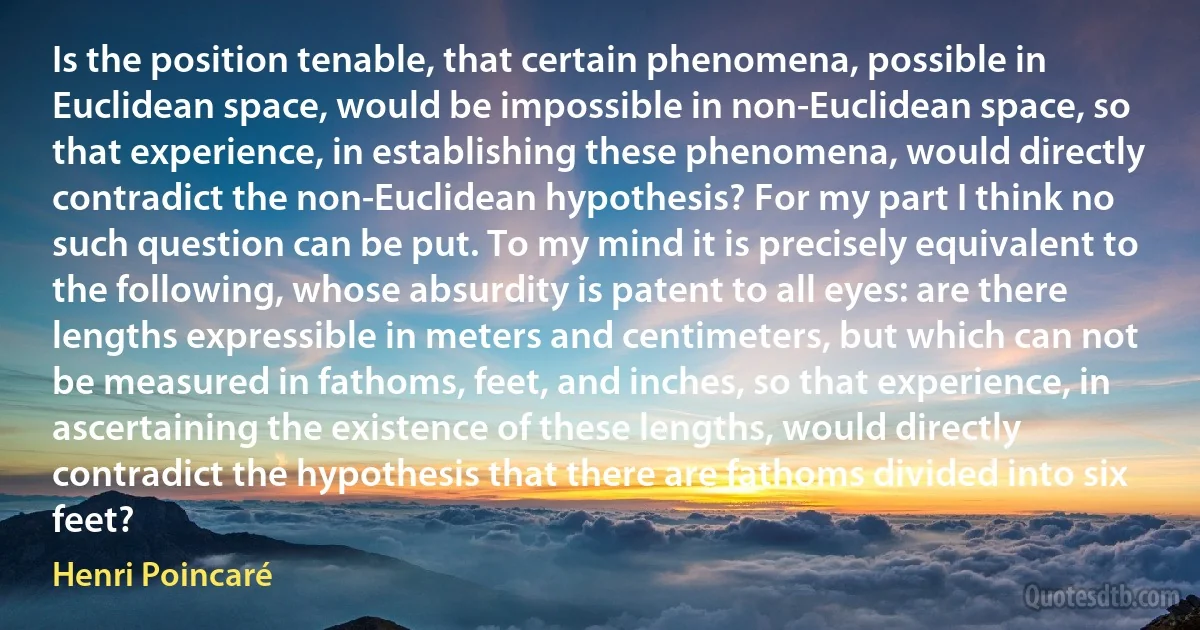
Is the position tenable, that certain phenomena, possible in Euclidean space, would be impossible in non-Euclidean space, so that experience, in establishing these phenomena, would directly contradict the non-Euclidean hypothesis? For my part I think no such question can be put. To my mind it is precisely equivalent to the following, whose absurdity is patent to all eyes: are there lengths expressible in meters and centimeters, but which can not be measured in fathoms, feet, and inches, so that experience, in ascertaining the existence of these lengths, would directly contradict the hypothesis that there are fathoms divided into six feet?
Henri PoincaréRelated topics
certain establishing experience feet following hypothesis impossible mind patent position possible question six space think eyesRelated quotes
When [ Abraham ] the "Pillar of the World" appeared, he became convinced that there is a spiritual Divine Being, which is not a body, nor a force residing in a body, but is the author of the spheres and the stars; and he saw the absurdity of the tales in which he had been brought up. He therefore began to attack the belief of the Sabeans, to expose the falsehood of their opinions, and to proclaim publicly in opposition to them, "the name of the Lord, the God of the Universe" (Gen. xxi. 33), which proclamation included at the same time the Existence of God, and the Creation of the Universe by God.

Maimonides
Philosophy is to be studied, not for the sake of any definite answers to its questions, since no definite answers can, as a rule, be known to be true, but rather for the sake of the questions themselves; because these questions enlarge our conception of what is possible, enrich our intellectual imagination and diminish the dogmatic assurance which closes the mind against speculation; but above all because, through the greatness of the universe which philosophy contemplates, the mind is also rendered great, and becomes capable of that union with the universe which constitutes its highest good.

Bertrand Russell
It is a fearful thing to hate whom God hath loved. To look upon another-his weaknesses, his sins, his faults, his defects is to look upon one who is suffering. He is suffering from negative passions, from the same sinful human corruption from which you yourself suffer. This is very important: do not look upon him with judgmental eyes of comparison, noting the sins you assume you'd never commit. Rather, see him as a fellow sufferer, a fellow human being who is in need of the very healing of which you are in need. Help him, love him, pray for him do unto him as you would have him do unto you.

Tikhon of Zadonsk
We are now in a position to prove the following propositions : -
1. The distance of the sun from the earth is greater than eighteen times, but less than twenty times, the distance of the moon (from the earth); this follows from the hypothesis about the halved moon.
2. The diameter of the sun has the same ratio (as aforesaid) to the diameter of the moon.
3. The diameter of the sun has to the diameter of the earth a ratio greater than that which 19 has to 3, but less than that which 43 has to 6; this follows from the ratio thus discovered between the distances, the hypothesis about the shadow, and the hypothesis that the moon subtends one fifteenth part of a sign of the zodiac.

Aristarchus of Samos
It is not infrequently our custom to seek to cover our own blank ignorance of certain subjects with the confident assertion that nothing ever has been or can be really known... and our treatment of this question of the life after death is one of the worst examples of this habit. If popular theology had not most unhappily altogether lost sight of the cardinal doctrine of reincarnation, its· views on this subject of death would naturally be entirely different. A man who realizes that he has died many times before regards the operation more philosophically than one who believes it to be an absolutely new experience fraught with all kinds of vague· and awful possibilities.

Charles Webster Leadbeater
